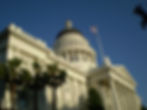
Downtown L.A. Skyline



Downtown L.A. Skyline

Lower Cost Bankruptcy Services in Los Angeles For Creditors!
916-900-4244
U.S. Bankruptcy Court, Central District of California Services
Motions for Relief from the Automatic Stay
When a debtor files a petition in bankruptcy an "automatic stay" arises under Section 362 of the Bankruptcy Code. The stay prohibits a number of acts against the debtor, the property of the debtor, and property of the bankruptcy estate. The consequences of violating the stay can be severe, but in appropriate circumstances judges may order the stay "lifted." Ask about our services in helping you obtain "relief from stay."
Defend Against Charges You Violated the Automatic Stay
The Bankruptcy Code is largely oriented to seeing that an "honest but unfortunate" debtor obtains a "fresh start" through a discharge in bankruptcy aided by exemptions. To provide relief, upon the filing of a petition the debtor becomes the immediate beneficiary of an "automatic stay." The costs of violating the stay can be substantial. If charged with a stay violation, we may be able to assist you through analysis, settlement, or defending against the charges.
Object to Exemption Claims
Individual debtors filing for bankruptcy typically claim that they owned certain property prior to bankruptcy that should be returned to them as "exempt" from the claims of creditors. A bankruptcy trustee may object to such exemption claims, but do not count on it. A creditor is authorized, and in the right circumstances may find it worthwhile, to challenge an exemption claim.
Prevent the Discharge of the Debt Owed to You
When a debtor files a petition in bankruptcy and you receive notice of the filing, the debtor will be discharged from personal liability on the debts owed to you if the discharge is granted and you have not taken action within demanding timelines to challenge the debtor's attempt to escape your claims. Congress has decided that certain types of debts should not be discharged, but it will generally require action on our part to show that the debts at issue meet the requirements to be excepted from discharge. We may be able to determine whether you are owed one of these types of debt and the likely costs and benefits of raising a challenge.
Prevent the Debtor from Obtaining a Discharge
In addition to preventing a debtor from escaping liability on a specific debt, the Bankruptcy Code authorizes trustees and creditors to bring an action to prevent the debtor from obtaining any discharge whatsoever. The bankruptcy discharge, it is said, is reserved for the "honest but unfortunate" debtor. The Bankruptcy Code contains a broad list of situations in which a debtor may be denied a discharge. It also provides that in some circumstances the bankruptcy court may revoke a discharge that was granted.
Miscellaneous Bankruptcy Services
Bankruptcy Appeals. The owner of this site has handled bankruptcy appeals in the district court, the Ninth Circuit Bankruptcy Appellate Panel, and the Ninth Circuit.
Rule 2004 Examinations. In practice trustees will not allow meaningful interrogation of debtors in the Section 341 meeting of creditors. As soon as a bankruptcy is filed the creditor should consider examining the debtor under Rule 2004 of the Federal Rules of Bankruptcy Procedure. Consideration should be given to whether a lawyer from outside Los Angeles can handle the task more economically than a local attorney. Even if a local attorney is needed, consider contacting this office. This office has relationships with qualified Los Angeles-area bankruptcy attorneys.
Proofs of Claims. In a so-called "no asset" case, the clerk of court may send out a notice instructing creditors not to file any proof of claim unless/until instructed to do so. That a debtor asserts a case is a "no asset" case does not make it so. We can file proofs of claims.